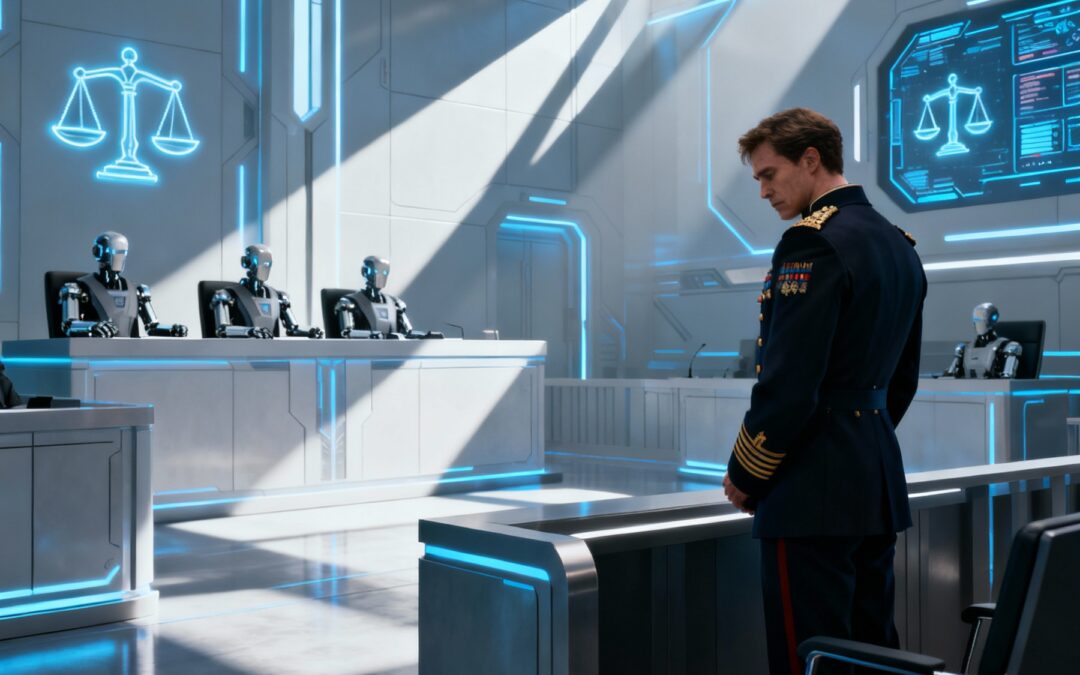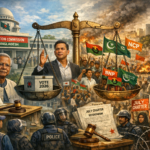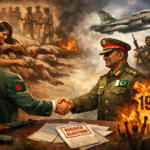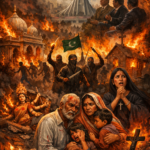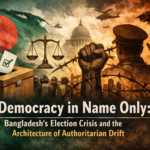For decades, Bangladesh’s armed forces stood as a symbol of national pride—born from the crucible of the 1971 Liberation War. Yet the institution that once carried the spirit of freedom has long been eroded by political exploitation, corruption, and an insidious drift toward ideological extremism.
1. From Liberation Vanguard to Political Tool
After independence, the army inherited both the discipline and the authoritarian reflexes of its Pakistani progenitors. Instead of nurturing a democratic tradition, successive generals turned the barracks into breeding grounds for political ambition. From Ziaur Rahman’s opportunistic rise in the late 1970s to H. M. Ershad’s decade of martial law, the military repeatedly betrayed its constitutional role.
Decades later, generals still seek privileges, foreign trips, and corporate control while the junior ranks carry the burden. This widening gap has hollowed out the esprit de corps that once defined the force.
Reference: The Daily Star, “From Freedom Fighters to Power Brokers: How the Military Lost Its Way,” 2023.
2. Corruption Under the Cloak of Discipline
During periods of martial law, the army became an economic conglomerate. Under the guise of “nation-building,” military-run enterprises expanded into construction, transport, and banking.
World Bank-funded “food-for-work” and road-building projects turned into channels of misappropriation. Senior officers pocketed large daily allowances while soldiers laboured for subsistence wages. The Military Law Code, meant for discipline, became a weapon to silence dissenters.
Reference: Transparency International Bangladesh, Military Business and Accountability in Bangladesh (2022).
3. The Shadow of Radicalisation
In recent years, intelligence agencies quietly admitted a troubling trend: the creeping influence of political Islam within military ranks. What began as a routine religious practice evolved into an ideological identity shaped by global currents—the 
Recruitment propaganda spread through social media and “study circles” in cantonment mosques. Yet instead of confronting it, the DGFI and Military Intelligence turned a blind eye, distracted by politics and foreign missions.
Reference: Dhaka Tribune, “Army Intelligence Admits Growing Islamist Leanings,” 2024.
Reference: Brookings Institution, Religious Radicalisation in South Asian Militaries (2022).
4. ICT Warrants and the Shattered Shield of Impunity
The International Crimes Tribunal-1 (ICT-1) recently issued arrest warrants for 15 serving and several former army officers over alleged crimes against humanity—including enforced disappearances and torture—during the previous government’s tenure (The Hindu, 8 Oct 2025; AsiaNews Network, 9 Oct 2025).
The army confirmed taking those officers into custody but complained it had not yet received formal charge sheets through official channels (Dhaka Tribune, 9 Oct 2025).
To many observers, this marks the first time the military’s historic impunity is being pierced. Others suspect political or ideological motivations within the tribunal. This perception mirrors civil-military tensions in Egypt, Jordan, and Pakistan, where secular armies and Islamist-leaning civic forces have repeatedly clashed for control of the state narrative.
The ICT’s composition and rhetoric have led critics to perceive an alignment with Islamist-influenced civil groups, reminiscent of Brotherhood-linked movements elsewhere, though no formal evidence establishes institutional ties. The symbolism alone has deepened mistrust between the court and the barracks.
5. Intelligence in the Dark
The DGFI and NSI have long acted as invisible hands behind Bangladesh’s politics—monitoring journalists, shaping elections, and silencing critics. That same culture of secrecy allowed ideological infiltration to fester. By prioritising regime surveillance over counter-extremism, the agencies failed to notice that the real danger was germinating within their own fraternity.
Reference: TBS News, “Security Agencies Prioritised Politics Over Radicalism Threat,” 2024.
6. Coup Fantasies and Institutional Decay
From 1975 through 2007, Bangladesh witnessed an almost cyclical pattern of coups. Each promised “national salvation,” each deepened the rot. By the 2010s, many officers were more interested in UN peacekeeping perks than patriotic service.
When loyalty is traded for privileges and silence for promotion, patriotism becomes theatre. The chain of command has become less about honour and more about procurement contracts, overseas postings, and business stakes.
Reference: Asia Pacific Defence Journal, “Bangladesh Army: Between Peacekeeping and Power Politics,” 2023.
7. The Price of Silence
Civil society long feared questioning the defense budget or cantonment empires. This reverence allowed the generals to reinvent themselves as businessmen and power brokers. The ICT’s intervention, however imperfect, may finally force a reckoning.
If the rule of law survives political manipulation, the myth of military sanctity will crumble—and accountability will become possible.
8. What Lies Ahead
Bangladesh now stands at a crossroads. The army’s leadership must choose between transparency and ideological regression. The world is watching whether it reforms or repeats the cycle of denial.
If younger officers embrace professionalism over patronage and resist imported radical ideologies, the institution could reclaim some of its lost honour. If not, history will treat it as another Middle-Eastern-style military class that traded its sword for a sermon.
9. The Final Reckoning
The Bangladesh Army’s decline is not sudden; it is the result of decades of unchecked privilege, political meddling, and moral decay. The uniforms may remain crisp, but the conscience beneath has corroded.
The tribunal’s actions—whatever their ultimate outcome—signal the end of the era of invincibility. For the first time since independence, men in uniform are learning that no one, not even a general, stands above the nation’s laws.
Selected Sources
-
The Hindu, “Bangladesh Army Takes Into Custody 15 Serving Officers After ICT Order,” 8 Oct 2025.
-
AsiaNews Network, “25 Former, Serving Bangladeshi Military Officers Charged at ICT,” 9 Oct 2025.
-
Dhaka Tribune, “Army Detains 15 Officers Over Crimes Against Humanity,” 9 Oct 2025.
-
The Daily Star, “ICT Cases: Army Takes 15 Officers Into Custody,” 9 Oct 2025.
-
The Business Standard, “Arrest Warrants for Army Officers Reach Relevant Authorities: ICT Chief,” 9 Oct 2025.
-
Transparency International Bangladesh, Military Business and Accountability, 2022.
-
Brookings Institution, Religious Radicalisation in South Asian Militaries, 2022.
-
Asia Pacific Defence Journal, “Bangladesh Army: Between Peacekeeping and Power Politics,” 2023.

